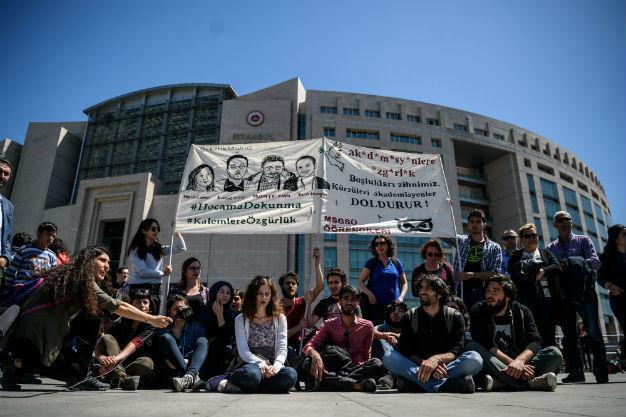Four Turkish academics charged with terror propaganda released
ISTANBUL

AFP photo
An Istanbul court ordered the release of four Turkish academics on April 22 on the first hearing of a trial opened against them for making “terrorist propaganda” when they read out a joint petition in January signed by over 1000 colleagues calling on the government to end the security operations against the outlawed Kurdistan Workers’ Party (PKK).The arrest of academics Esra Mungan, Muzaffer Kaya and Kıvanç Ersoy came after the three were detained for holding a press conference on March 10 at the Education and Science Workers’ Union’s (EĞİTİM-Sen) 6th Office in Istanbul, where they read out a declaration entitled “We won’t be part of this crime.”
The fourth academic, Meral Camcı, was arrested later on April 1, after she returned to Turkey and appealed to the police about the arrest warrant issued in her name. In her testimony, Camcı argued criticizing the government’s policies was an exercise in freedom of expression and fulfillment of her duty “as a citizen and an academic.”
During the trial, the public prosecutor called for an abatement of the proceedings, saying the subject of the trial may be covered under Article 301 of the Turkish Penal Court (TCK) penalizing “insulting Turkey, the Turkish nation or Turkish government institutions,” which would require permission from the Justice Ministry.
The prosecutor asked the court to release the suspects to prevent “rights violations,” explaining that the ministry’s response may be delayed. The request was granted by the court.
Meanwhile, riot police stood guard outside the Çağlayan courthouse in central Istanbul, where two journalists accused of divulging state secrets attended the third hearing of their espionage trial, before staying on to watch the scholars’ case.
“We are at the academics’ hearing. The same groundless allegations,” tweeted Can Dündar, editor-in-chief of daily Cumhuriyet, who was also at the courthouse to attend his own hearing in a trial on “espionage” charges for reporting on Turkish intelligence trucks allegedly transporting weapons to Syrian rebel groups in November 2014.
Some 500 people had gathered at the court to support both the journalists and the scholars, with protesters holding up placards reading “Freedom for the academics” and “Freedom for the pencils.”
Opposition members of parliament participated in the rally, as two armored police trucks equipped with water cannons stood by.
The university scholars are being prosecuted for signing a petition along with over 1000 colleagues and supporters denouncing the government’s military operations against PKK militants in the country’s southeast.
The petition urged Ankara to halt “its deliberate massacres and deportation of Kurdish and other peoples in the region,” infuriating President Recep Tayyip Erdoğan, who accused them of falling into a “pit of treachery.”
The four are accused of engaging in “terrorist propaganda” and “inciting hatred and enmity” for not only signing the plea but making a statement on the same lines on March 10, a day before the petition was published.
The court’s verdict said the declaration was in support of the PKK and showed similarities to earlier remarks made by Bese Hozat, a PKK figure.
The academics denied the charges, with Kaya and Ersoy saying they had not heard of Hozat before.
Mungan is an academic at Boğaziçi University’s psychology department and Kaya lectures at Nişantaşı Univeristy. Ersoy lectures at Mimar Sinan Fine Arts University.
If convicted, Mungan, Camc, Ersoy and Kaya face up to seven and a half years behind bars, according to Academics for Peace (BAK), the organization behind the contested statement.
The defendants had been held in high-security closed prisons in Istanbul since their arrest last month.
The probe into the petition was opened after 1,128 academics from 89 different universities - including foreign scholars like Noam Chomsky, David Harvey and Immanuel Wallerstein - signed a declaration titled “We won’t be part of this crime.” Universities and prosecutor’s offices across the country subsequently opened probes into many of the 1,128 Turkish and foreign academics and intellectuals who fell within the Turkish state’s jurisdiction, arguing that the petition exceeded the limits of academic freedom. Erdoğan and government officials have repeatedly criticized the academics who signed the petition, accusing them of supporting the PKK.
In the 2016 World Press Freedom Index, Turkey slipped two places to 151 out of 180, Reporters Without Borders said April 20, citing the president’s “offensive” against the media and his critics.
Almost 2,000 people have been prosecuted for “insulting” Erdoğan since the former premier became president in August 2014, Turkey’s justice minister said in March.
















